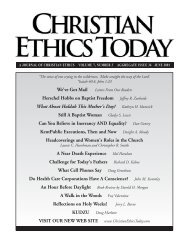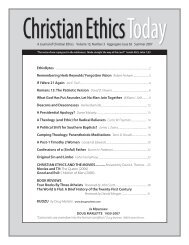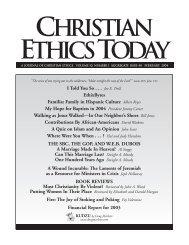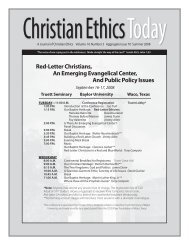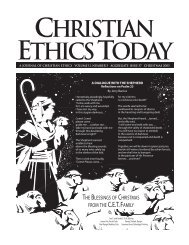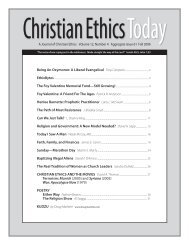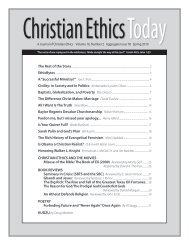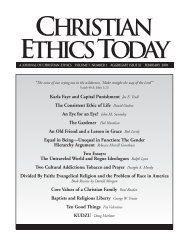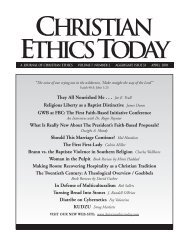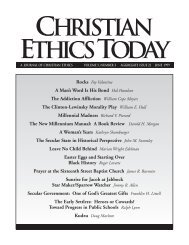Issue 052 PDF Version - Christian Ethics Today
Issue 052 PDF Version - Christian Ethics Today
Issue 052 PDF Version - Christian Ethics Today
Create successful ePaper yourself
Turn your PDF publications into a flip-book with our unique Google optimized e-Paper software.
Of making many books, there is no end,” says the Teacher<br />
of Ecclesiastes (12:12b). Certainly with regard to areas<br />
such as biblical studies the Teacher is exactly on target. With<br />
regard to texts related to <strong>Christian</strong> ethics, however, the<br />
Teacher is not so accurate as such get written and published<br />
only every so often.<br />
Hollinger’s book is one of those few and most recent<br />
given to the treatment of an overview of <strong>Christian</strong> ethics. The<br />
book’s uniqueness becomes more noticeable as the reader<br />
realizes Hollinger has attempted to develop a perspective, a<br />
framework for understanding and working in <strong>Christian</strong><br />
ethics, without a major portion of the book given to a reflection<br />
on social issues. A traditional, practically expected,<br />
approach is to develop foundational ideas then work through<br />
issues of human sexuality, race relations, economics, public<br />
policy, and so forth. Thus, a commendation comes from this<br />
reviewer for Hollinger to attempt a relatively unusual<br />
approach.<br />
Perhaps Hollinger’s background shaped this development.<br />
Currently, he is President and Professor of <strong>Christian</strong><br />
<strong>Ethics</strong> at Evangelical School of Theology in Myerstown,<br />
Pennsylvania. Prior to this role he was Vice Provost and<br />
College Pastor and Professor of <strong>Christian</strong> <strong>Ethics</strong> at Messiah<br />
College in Grantham, Pennsylvania. Apparently a giftedness<br />
and skill in the realm of organization and attempting to deal<br />
with the core dynamics of a matter move throughout<br />
Hollinger’s approach to theology and life.<br />
Hollinger is also a Fellow for The Center for Bioethics<br />
and Human Dignity in Bannockburn, Illinois. Though he<br />
has done extensive work in bioethics, Hollinger correctly<br />
reminds us, with Choosing the Good, that <strong>Christian</strong> ethics is<br />
not primarily a search for dealing with faddish social issues.<br />
Rather, one should be working with a framework, a paradigm<br />
of decision-making, which can encompass any social issue.<br />
Still, each chapter of the text begins with a case study or a<br />
lengthy statement. These introductions set the context for<br />
the chapter’s development. One potential shortfall, however,<br />
is that cases can mislead the reader. Cases may have benefit as<br />
“<br />
26 • CHRISTMAS 2004 • CHRISTIAN ETHICS TODAY<br />
Book Review<br />
Choosing the Good:<br />
<strong>Christian</strong> <strong>Ethics</strong> in a Complex World<br />
Dennis P. Hollinger, Grand Rapids: Baker Academic, 2002, $21.99.<br />
Reviewed by William M. Tillman, Jr.<br />
T. B. Maston Professor of <strong>Christian</strong> <strong>Ethics</strong>, Logsdon School of Theology<br />
Hardin-Simmons University, Abilene, TX<br />
they assist a decision maker toward developing inductive reasoning<br />
or making analogies to real life with a case. Cases can<br />
also be too simplistic so as to do no more than establish the<br />
case maker’s point—which may not be on target.<br />
Choosing the Good is divided into four major parts: (1)<br />
The Foundations of <strong>Christian</strong> <strong>Ethics</strong>; (2) The Contexts of<br />
<strong>Christian</strong> <strong>Ethics</strong>; (3) Making Ethical Decisions; (4) Applying<br />
Christina <strong>Ethics</strong> in Culture and Society.<br />
Part 1 looks at foundational ethical theories. Hollinger<br />
delineates much of the basic information needed for the<br />
reader or student to understand the nature of ethics and especially<br />
the interface of <strong>Christian</strong> ethics and pastoral care, along<br />
with public policy.<br />
A hint of overgeneralization begins to appear through this<br />
section, however, which marks Hollinger’s material, especially<br />
as a critique deals with ideas with which he either is unfamiliar<br />
or unappreciative. His observations regarding<br />
character and virtue ethics develop from a straw-figure image<br />
of these areas. Interestingly, chapter 3, “A <strong>Christian</strong><br />
Worldview: Foundation for <strong>Ethics</strong>,” is an overview of primarily<br />
Old Testament theology.<br />
Part 2 explores the contexts in which ethical commitments<br />
and judgments emerge. The two chapters in this section<br />
treat modernity and postmodernity, intriguing<br />
contemporary concepts. Hollinger makes note of contemporary<br />
society continuing to operate in modernity, a point not<br />
made enough among academics. His chapter on postmodernity<br />
needs some deeper analysis.<br />
Part 3 considers some of the historical figures who can<br />
provide guidance for contemporary decision makers. The<br />
three chapters in this part probably should have been<br />
arranged sooner in the book. Chapter six, “Three Motifs for<br />
Making Ethical Decisions,” puts forward models for decision-making.<br />
Rather than being an analytical treatment,<br />
though, Hollinger provides a description of Edward LeRoy<br />
Long, Jr.’s works, A Survey of <strong>Christian</strong> <strong>Ethics</strong> and A Survey of<br />
Recent <strong>Christian</strong> <strong>Ethics</strong>. Frankly, without Long, Hollinger<br />
would not have had a chapter.



